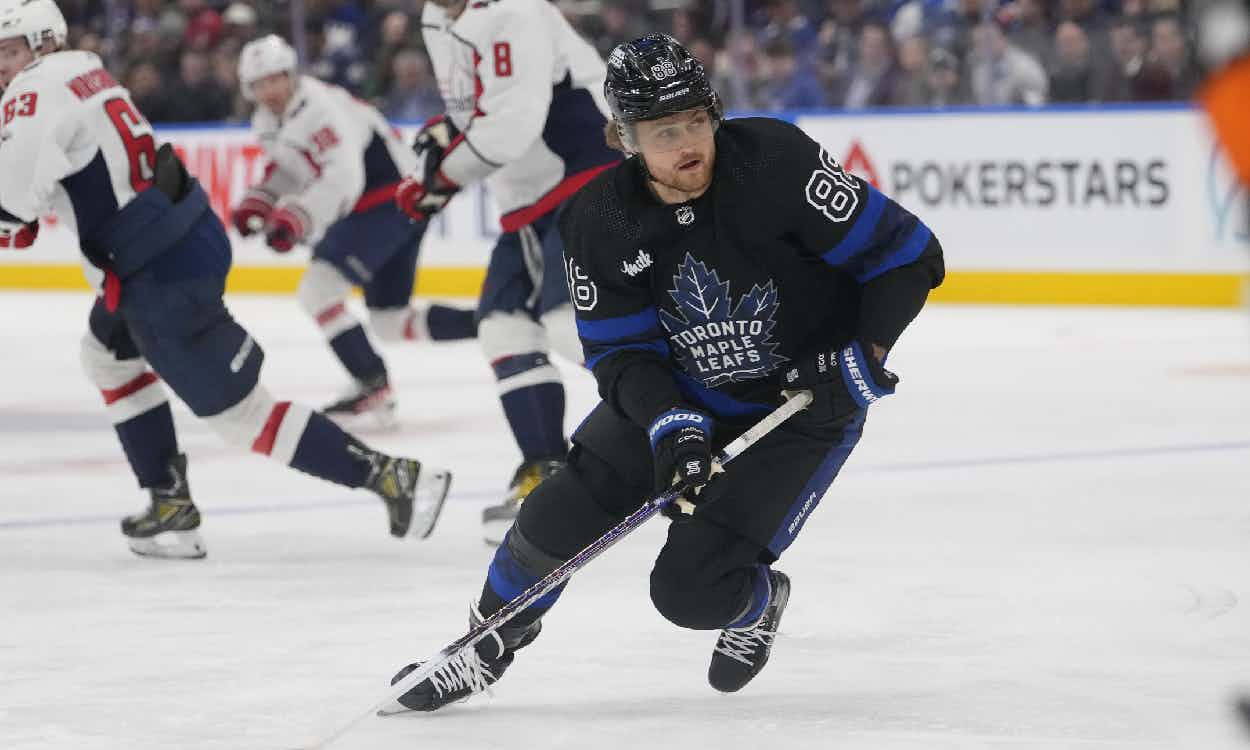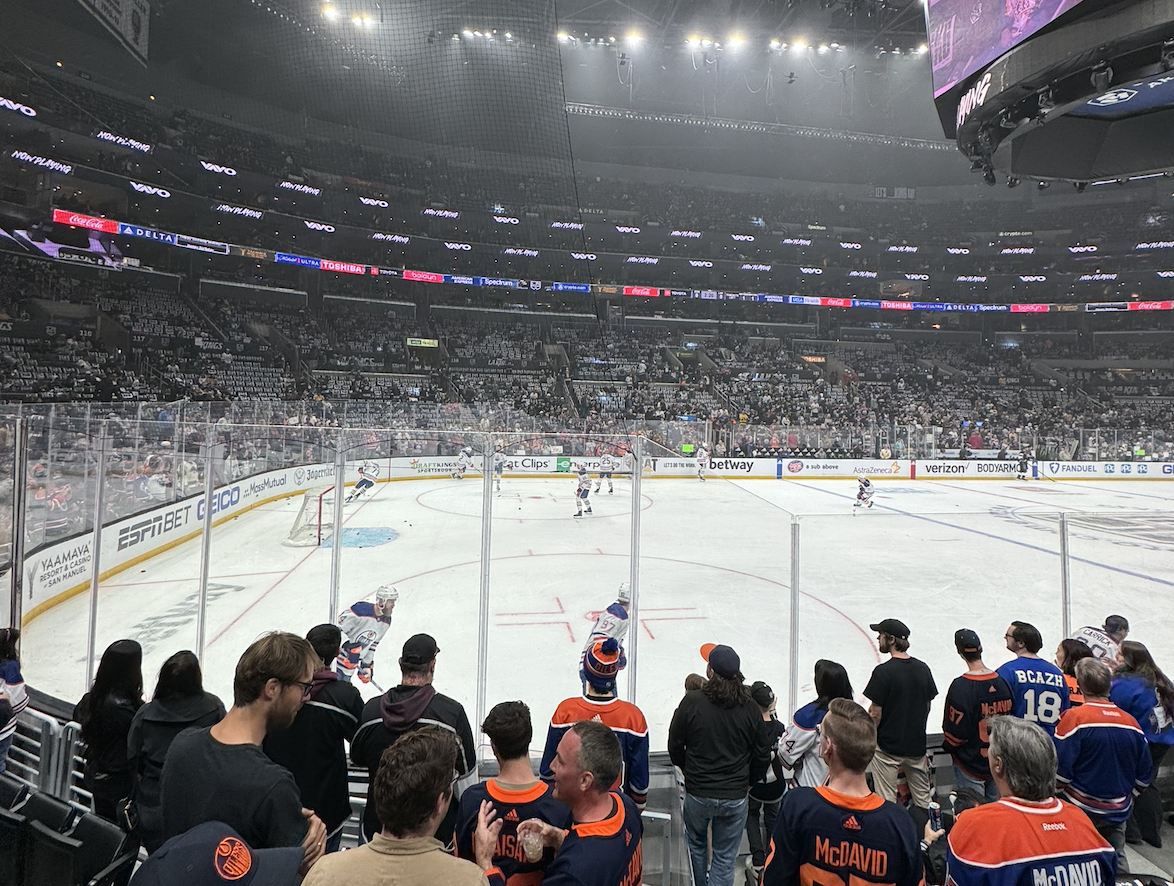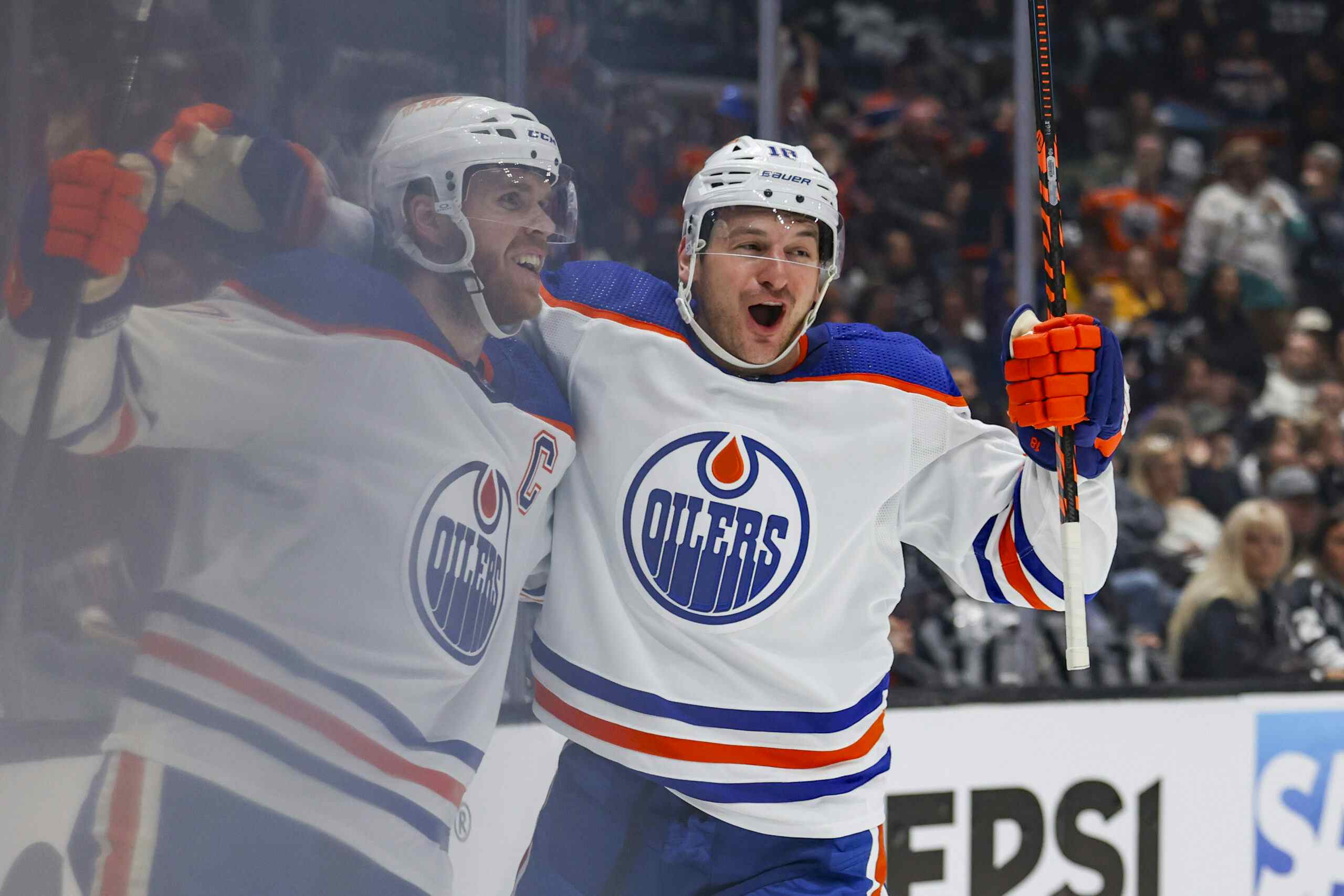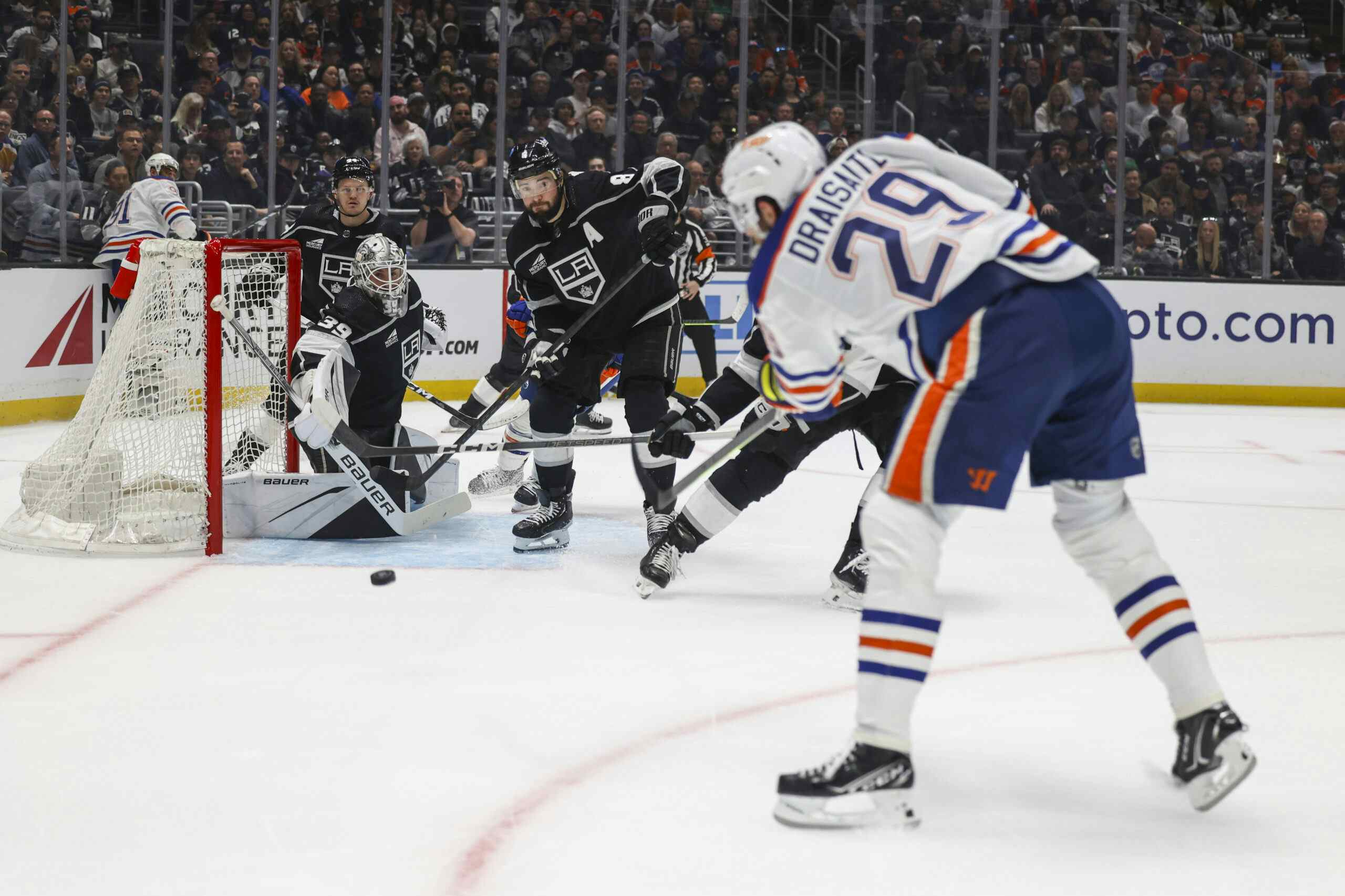SIT DOWN WITH JOE SACCO
By Jason Gregor
11 years agoI caught up with Avalanche head coach Joe Sacco yesterday and got a chance to discuss his team’s identity, the challenges of building around a young core of players, Paul Stastny value’s and how do the Avalanche game-plan v. the Oilers.
Gregor: I look at the Oilers, and I look at the Avs, and I see a lot of similarities. Being a former NHL player, and a guy who stayed in the NHL because you understood the work ethic necessary to play your role every night, do you have to be more patient with young guys as they try to find that level of competitiveness that is needed to be successful every night in the NHL?
Gregor: I look at the Oilers, and I look at the Avs, and I see a lot of similarities. Being a former NHL player, and a guy who stayed in the NHL because you understood the work ethic necessary to play your role every night, do you have to be more patient with young guys as they try to find that level of competitiveness that is needed to be successful every night in the NHL?
Sacco: I think you have to. Like you say, you look at both clubs; relatively young, going into year four now and it’s been a little bit of a process, but at the same time we’re all in this business because we’re all extremely competitive and we want to win hockey games, that’s what it’s about, it’s about winning.
It’s also about young players trying to find their way in a league that, obviously it’s a lot younger league than it was when I played, young players trying to find a consistent game night in and night out. And there’s a fine line as far as you’ve got to let the young kids, because you’ve got to let them play, number one.
You want them to learn from the mistakes they make within the course of the game. We’ve got some guys now that even though they’re young, they’ve been in the league two, three, four years now, and they’ve gained some experience. The awareness in situations that come within the course of the game, playing the score, knowing your opponent, knowing who you’re playing; it’s all of those details that are involved in the game. I think our guys are starting to grasp that and understand that’s a big part of hockey. I call it knowing the game within the game. But it takes a bit of time, and at times it is hard to be patient with them.
JG: Ultimately you want to win games, but the only way for players to learn those aspects is to put them in there even though sometimes you know that they’ll be outmatched.
How did you balance that; trying to win but also understanding that guys need to mature and learn by their mistakes?
JS: What I tried to do was you put these players in situations and put them in those situations over and over again. You can’t just put them in once and if it doesn’t work say ‘okay let’s try something else.’ It’s a matter of sticking with it, trying to teach whether it’s a young offensive centreman, putting him in situations where he has to be a responsible player.
Whether it’s a key faceoff in the defensive zone if we’re up a goal, late in the game and maybe if at one point it doesn’t work out, it’s about getting him in that situation again, repeating it over and over so that they understand the importance of it. And once that situation comes up again they’re more comfortable and able to deal with it. It puts less pressure on them if they’re more prepared.
That’s kind of been the philosophy of just letting them work through it and putting them in those situations and showing them that whether it’s a penalty killing situation and you’re dealing with maybe a couple of offensive guys, you want them to get out there. There’s a bit of a learning curve out there in the beginning but you’ve got to stick with it.
JG: A lot of people were surprised at how quickly Ryan O’Reilly adjusted to both ends of the rink. The same with Gabriel Landeskog and then of course Matt Duchene might be the best pure offensive one out of the three. Talk about how different guys learn different parts of the game and then how you find out as a coach which role they’re more comfortable with.
JS: Well, it’s been fun. Matt Duchene and Ryan O’Reilly came in the same, and Matt obviously had the reputation of being a dynamic offensive player with great speed, and great offensive instincts, while Ryan basically made the team on his good two way play. Nothing jumped out at us offensively, but certainly Ryan’s awareness, his ability to play the game away from the puck was extremely good at a young age so they both came into the league making the team at 18 years old because they brought different elements to the team. But as it has evolved, Ryan’s turned himself into a really good two-way player, he’s got good offensive ability and he’s a good two-way centreman.
Matt, he continues to really improve his play offensively and I think that the biggest thing about Duch this year has been his commitment trying to play away from the puck. He’s made a real conscious effort to be good at both ends of the rink, play a 200ft game, and, in turn, I think that he’s had a real good season so far because of his commitment. His natural ability will take over, his skill will take over once the work ethic and everything else falls in. He’s been really good for us.
And with Gabe, Gabe is kind of a mix. Gabe plays a different style than both of those guys. He’s like a bull out there. He’s strong, he’s heavy, he plays heavy, he plays physical, he bangs around and then he’s obviously got some skill to finish things off.
So they’re all different and they all bring different elements to the team.
JG: When you look at a player like Paul Stastny, in his first three full seasons he had 228 points in 229 games. He tallied 78 points, 71 and 79 points, but he hasn’t cracked 60 points since and this year he’s on pace for 32 in 48 games. Has he altered his game, is he put in different roles or is this a player that you still feel could get back to being a 70-point player?
JS: Well I don’t know, I’m not going to put a number that we expect as far as points from him, but I will say this about Paul; I think that he flies under the radar quite a bit and maybe it’s not fair to him.
We talk about some of our other players like we just did, like Landeskog and Duchene and Paul’s still a very good player for us. He logs very big minutes for us, he’s probably playing on average 19 minutes a night. He does a lot of the work against the other team’s top lines; he takes some of the load off of the other guys because he’s able to play a big heavy game.
Like last night he saw a lot of heavy action against Thornton. And in the game before that against Chicago he was matched up against Toews all night. So those aren’t easy tasks and Paul does a lot of that stuff that goes unnoticed, he flies under the radar a little bit.
I think that his role has maybe diminished a little bit with the addition of some of the players we’ve added in recent years, but he still plays on our first power play unit and right now he’s playing with Landeskog and Jones. He’s a very good player for us. He understands the game very well, a smart player, knows how to play at both ends of the rink.
JG: You guys have had some serious injury problems this year. Steve Downie, a real good energy guy who plays in your top six has basically been gone all year. He’s a different type of player who can bring some animosity, offence and a strong competitive fire. How has his injury impacted your team?
JS: He brings a lot of different ingredients like you just said. He plays on that edge, he unnerves people and he makes people uncomfortable. And on top of all of that, he’s a really good hockey player; he has the ability to make plays.
Last year when he got here in a trade we put him with O’Reilly and Landeskog and that was arguably one of our best lines down the stretch. We miss all of those intangibles that Downie brings into our lineup, but we’ve dealt with a number of other injuries and it’s kind of common around the league this year. Every team has dealt with it and it’s a matter of being able to overcome it.
If you can stick with it and hang around like we’ve been able to do, and now we’re getting healthy again. We have Johnson back; we have Wilson back in the lineup. We got Landeskog back recently, and then we had the addition of Ryan O’Reilly so we’re looking more like the team that we thought that we would have in training camp. And in the last few games it shows. We’re back in the mix of things here and now we’re halfway home now and it’s just a matter of sticking with it through the season here.
JG: Erik Johnson has returned. He can play 20 minutes a night and is a big body, and a good skater. When you look at his potential, we see a lot of defencemen who just take some time to develop. He’s in his 6th season and around this time many D-men take a jump where the game just suddenly clicks for them. Is Johnson there yet, or is he still a bit away from becoming a dominant number one defenceman?
JS: Well I still think it’s going to be a little bit of time; he’s finding his way still. With EJ I think that he puts a lot of pressure on himself to be that guy and we’ve had lots of good conversations about slowing the game down. I just want him to be really good defensively to start out with and be hard to play against, use that size and that skating ability to help us get out of our own end.
I think offensively is where he puts a little bit too much pressure on himself. Just play hard, compete, make good passes, make good plays and I think that the offensive side will kind of fall in line for him after that. I’m not going to sit here and predict what numbers he’ll have or anything like that. I don’t want him to worry about the numbers in those columns, I’d rather he worry about the number in the +/- columns and things like that. As you said he’s a guy who can play over 20 minutes a night, lean on people, use his weight, and I still think he’s still on tract to become that. He’s going to be a real good defenceman. I just don’t know how far he’ll go.
JG: Last time you faced the Oilers there was over 80 shots and 10 goals. Do guys naturally try to play run and gun with them? How do you look at that match up and do you think your team excels playing that open style and relying on the young guys to let it loose?
JS: No, I don’t think so. I think we certainly played them that way the last time we were up there and they had over 50 shots on net; they really gave it to us. We were up in the game by three or four goals and they ended up coming back to win the game, but long term that’s not really going to be a good process for winning hockey games for us we feel, but they have an exciting team.
They’re arguably the fastest team in the league in terms of their overall team balance, and they make it interesting because they force you to open up a against them and it becomes a little bit of a track meet out there at times, As well as we can skate, and go up and down the ice, we’re still trying to teach our guys to play more of a grinding style, we want to have more puck time in the offensive zone and close some territory and not really turn it into one of those games.
I don’t think that there are many teams in the league that can play that type of game with the Oilers. They’re so fast, their transition game is so strong, but like I said, sometimes it’s hard not to get caught up in it and it starts going back and forth a bit and as a coach, you’re sitting there, you’re starting to pull the hair out of your head. But the game is just so fast, at times things are starting to look so quick out there, you’ve got to try to slow it down a little bit.
But we’ve had good games against them, some exciting games. I know that from a fan’s standpoint it’s been exciting, not so much from a coach’s standpoint, but we’re going to try to not slow the game down because we still like to play fast, but certainly we don’t want to turn this into a track meet on Tuesday.
JG: Here we are the halfway point of the seasons if you guys are going to make the playoffs, similar to the Oilers, you’ll need to go on a pretty good run in the second half. Have you seen signs from your team recently that says ‘OK, we’re ready to go,’ and do you and the players discuss that they’ve likely got to win 7 out of 10 games the rest of the way to make the playoffs?
JS: We know exactly where we’re at, and we know exactly what we need. It’s basically crunch time and you can’t look at it any other way and that’s the approach that we’ve taken. It really is, every game is almost like an elimination game and that’s how we’re treating it.
I look at our last four games as a positive sign for our team. We won our last two games with San Jose and Chicago and the two games prior we played Chicago and in Detroit, and even thought we didn’t come out with any points in those two games we certainly played well enough to. I look back to those four games as a good sign for our team. I think that we’re moving in the right direction, we’re getting people back, we’re getting healthy, and we’re starting to really play the game the right way.
So everybody’s right there in the mix of things and there are really only one or two teams right now that are in a different atmosphere and that’s Chicago and Anaheim. I really still think that 6 spots are up for grabs for a lot of the other teams.
It’s going to be an interesting second half of the season and we’ll have to see where it goes.
QUICK HITS
- You know the Avalanche will be irked after surrending 56 shots the last time these two teams played. The Avs are healthier and according to Sacco playing better. The Oilers need to be ready tonight.
- Have you wanted to play in the WSOP. The 2nd annual Gregor Show poker tourney will be announced later today on my show. However, if you like the Jason Gregor Show facebook page, there will be an early annoucement around noon today on that page before my show. The winner gets hotel, flight and a seat ($10,000) at the WSOP in Vegas. We also raise over $8,000 for the MS Society as well. Good luck.
RECENTLY BY JASON GREGOR
Recent articles from Jason Gregor





